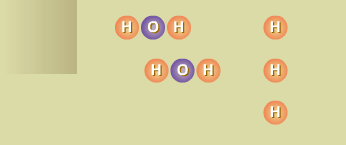

|
|
|

|
On Fire Chain Reaction (2) 
For combustion to take place, enough heat needs to be produced by the reactions to keep the temperature of the fuel and oxygen at or higher than the material's ignition temperature. When heat is present, chemical reactions occur because lone hydrogen and oxygen atoms are very reactive; they quickly combine with other molecules or atoms. This leads to a rapid "branching chain reaction." Though the chemical chain reaction that takes place when hydrogen burns may seem complex, it's much simpler than the one that takes place with other fuels. Even with a seemingly simple fuel such as methane (CH4), more than 100 individual chemical reactions take place. For a step-by-step description of how hydrogen burns, check out Step Through the Reaction. Then move on to this feature's next section: Shuffle Atoms. Strike a Match | Shuffle Atoms | Flame Experiment
The Producer's Story | The World on Fire | Outfitting Wildland Firefighters How Plants Use Fire | Glossary of Fire Terms | Wildfire Simulator | On Fire Resources | Transcript | Site Map | Fire Wars Home Search | Site Map | Previously Featured | Schedule | Feedback | Teachers | Shop Join Us/E-Mail | About NOVA | Editor's Picks | Watch NOVAs Online | To Print PBS Online | NOVA Online | WGBH © | Updated June 2002 |